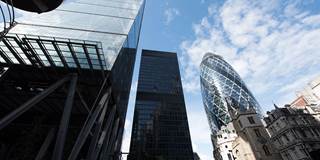In the year since the British voted to leave the EU, the UK economy has proved surprisingly resilient. But if the British economy is to cope with Brexit as well as it has coped with the Brexit vote, the government, like businesses, must minimize the impact of uncertainty by managing that uncertainty effectively.
LONDON – Nearly a year ago, the British voted – 52% to 48% – to leave the European Union. Many expected the vote to produce severe economic volatility. But the economy, so far, has proved resilient, though as we head into this week’s snap general election, there are signs that higher inflation is taking its toll on consumers and some businesses. The question is whether the economy can withstand the actual divorce proceedings.
In the wake of the Brexit vote, swift action by the Bank of England helped to calm financial markets and keep credit flowing. Unlike during the global financial crisis of 2008, the cost of credit for most firms and families in the United Kingdom hasn’t risen; if anything, it has fallen. All the while, British consumers have done what they do best: spend their money in stores and online. Household spending supported overall growth close to 2% last year.
The big change in financial markets has been the steep decline in the value of the pound. The weaker exchange rate has helped UK-based exporters’ competitiveness. The April industrial trends survey, conducted by the Confederation of British Industry (of which I am chief economist), showed the strongest rise in manufacturing export orders since 2011. But this is a double-edge sword: British manufacturers also face the fastest rise in average unit costs since 2011, owing to the rising prices of imports.

LONDON – Nearly a year ago, the British voted – 52% to 48% – to leave the European Union. Many expected the vote to produce severe economic volatility. But the economy, so far, has proved resilient, though as we head into this week’s snap general election, there are signs that higher inflation is taking its toll on consumers and some businesses. The question is whether the economy can withstand the actual divorce proceedings.
In the wake of the Brexit vote, swift action by the Bank of England helped to calm financial markets and keep credit flowing. Unlike during the global financial crisis of 2008, the cost of credit for most firms and families in the United Kingdom hasn’t risen; if anything, it has fallen. All the while, British consumers have done what they do best: spend their money in stores and online. Household spending supported overall growth close to 2% last year.
The big change in financial markets has been the steep decline in the value of the pound. The weaker exchange rate has helped UK-based exporters’ competitiveness. The April industrial trends survey, conducted by the Confederation of British Industry (of which I am chief economist), showed the strongest rise in manufacturing export orders since 2011. But this is a double-edge sword: British manufacturers also face the fastest rise in average unit costs since 2011, owing to the rising prices of imports.